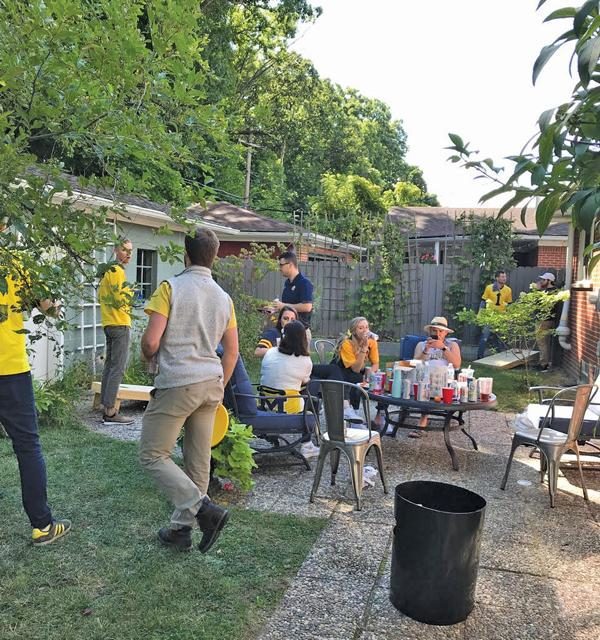In other incidents, festive screams from a bridal party woke a neighborhood at 1 a.m., outdoor parties have spilled onto neighbors’ lawns, and a group of thirty-something men asked a group of fifteen-year-old girls to “party” with them.
These incidents didn’t happen in student neighborhoods. All occurred in areas zoned for single-family use–but where Airbnb and other short-term rental platforms are encouraging owners to turn entire homes into miniature, unregulated hotels.
“Nobody is emailing me to say I’ve got short-term rentals next to me and … they’re so much better than student housing,” said Ward Four councilmember Elizabeth Nelson. “Nobody sends me an email like that.” Instead, Nelson says, residents tell her, “I’ve got these short-term rentals and they’re a nightmare.”
An October public meeting at the Westgate Public Library drew a standing-room-only crowd. When facilitators asked how many earned income from Airbnb or other short-term rental platforms, about 40 percent raised their hands.
They “interrupted a lot and didn’t [wait] their turn,” says Audra Eddy, a resident unhappy that a house in her northwest-side neighborhood had been redeveloped and is now dedicated to short-term rentals.
Maria Zaborniak, who lives between Huron and Miller near Seventh, says the short-term rental operators “had an excuse for everything.” For example, she says, when a resident brought up the effect of short-term rentals on housing affordability, a landlord “said something to the effect of there’s never been affordable housing [in Ann Arbor.] And short-term rentals don’t affect affordable housing anyway.”
That’s debatable. A 2019 review of studies on the impact of Airbnb by the liberal Economic Policy Institute concluded that those rentals in New York City “may have raised average rents by nearly $400 annually.”
At the meeting, a bigger concern was renting out entire houses by the night in single-family neighborhoods. Zaborniak was among those awakened in September when a member of a bridal party staying in a short-term rental behind her home started screaming in the street.
Such conflicts are likely to increase as outside investors turn more homes into short-term rentals. An investment site, AirDNA.co, encourages investors to look for properties they won’t have to actively manage. According to the site, “we believe that purchasing a property far from where you live forces you to make your investment a passive one, and will give you significantly higher returns as you have the whole nation to pick from to get the best returns.” They specifically cite Ann Arbor as a good place for outsiders to get that “passive income.”
“The growth of Airbnb over the past three or four years has been dominated by really large property owners, people who own three, four, five, fifteen properties,” says Economic Policy Institute research director Josh Bivens. “These are landlords who have just chosen to become landlords in the short-term rental market rather than the long-term [one].”
One short-term rental operator at the meeting felt that her side was shortchanged. “I didn’t feel like we really had the opportunity to educate the community at large, and definitely city council members that were there as well, on exactly how Airbnb works,” says Christine Willacker, who operates both long-term and short-term rental units in the city.
The planning consultants running the meeting said they had identified approximately 1,400 housing units in Ann Arbor available for short-term rental. While most fit the original Airbnb model–people renting spare rooms in their own dwellings, 131 were offered for rent for more than 150 days between August 2018 and July 2019.
Willacker says that, in her opinion, the consultants didn’t have “clear data” to demonstrate that short-term rentals are a nuisance. The AAPD doesn’t track which calls take them to short-term rental units versus other properties. In 2014, however, New York City did a report that cited “thousands of complaints” to city and state agencies including problems with noise, illegal dumping of garbage, vandalism, and theft.
Willacker argues that, at least on Airbnb, issues can be solved through the platform’s online system that allows guests and operators to rate each other. “You don’t want to get a bad review because that’ll kill your business. … If they get a bad review, they don’t want that either,” she says.
But neighbors who have problems can’t post reviews, and Airbnb is only one of many short-term rental platforms active in the city.
Tim Sperlbaum, who lives next door to the home that hosted the two-story beer bong, says that on another occasion, a group of male renters repeatedly invited his underage teen daughter and her friends over to “party.”
Greg Anderson, who owns the home, says he rents it out on select weekends to pay his property taxes. Since those incidents, he says, he no longer goes out of town when guests are at his house but stays nearby so he can respond quickly if there’s a problem. Sperlbaum says there haven’t been any problems this year.
Hosts who don’t live in Ann Arbor are less likely to take personal responsibility for problems caused by their “passive investments.”
“I think when people take money in, they feel a lot more entitled and a lot more unaware or unaccepting of other people and how they’re impacting the community,” says Kathleen Hiraga. Hiraga would like to see an ordinance similar to the one passed by Santa Monica in 2015, which among other things requires that the property owner be present during all short-term rentals. “I think [landlords] would be the first to start complaining if noise and parties were going on next door [to their own homes],” she says.
The city doesn’t allow more than four unrelated residents in rental units, but Hiraga says that twice that many have packed into the three-bedroom house next door to hers. When she told one about the city rule, she says, he got upset–and she later received a letter from the landlord’s attorney, threatening legal action for interfering with his business. She says that in a separate conversation, the landlord told her that he and his partner are looking to buy other houses on her street because, “this is working into our business model.”
Ward Five councilmember Ali Ramlawi says he expects that council will be considering potential regulations on short-term rentals “at the very early part of next year.”


